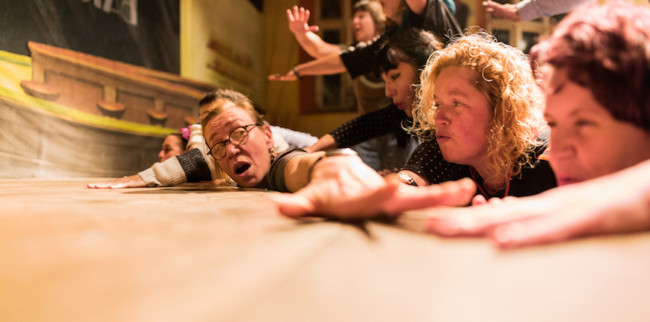Differences Between Clowning and Fooling
Apr 11 2018

There's still time to apply for our August 2019 Summer Schools! Here's a bit more info to help you choose the right Summer School for you.
What’s going to happen to me if I sign up for Summer School?
If you sign up for Summer School, you'll get 5 days in a well-held space, with a bunch of very interesting people, playing, reflecting and developing skills in Clowning (5-9 August) Physical Theatre (12-16 August) Comic Storytelling (19-23 August) or Fooling (26-30 August).
What's the difference between Clowning and Fooling?
If you've already attended my Introduction To Clowning weekend (which you need to have done to attend summer schools), you should have a fair idea of what clowning is about. Clowning is a state of free play, where connection is our number one priority. My style of clowning encourages the individual to develop the confidence to embrace their vulnerability and allow themselves to be seen from within the safety of the clown archetype. The Clowning Summer School week is designed to help you turn up your natural curiosity, increase your empathy, uncork your boundless imagination and explore your own unique comic timing. You'll cultivate a ridiculously bold, surprisingly sensitive and jaw-droppingly audacious quality of play.
Fooling is a solo form of improvisation, where you walk into the empty space and discover various parts of yourself (known as 'masks'), waiting to come out and be seen. Some of your cast of internal characters may have important things to say, some may want to dance, some may want to sing, some may want to lie around doing absolutely nothing. The Fools' task is to step out of the way of themselves and let the masks come out to play. The Fool's cast can include the Clown, but Fooling is not always funny. Sometimes Fooling is hilarious, sometimes it's tragic, sometimes it's simple, sometimes it's complex; the Fool's mission is to speak the truth, which means you can take whatever form is required to say what must be said, so that the audience can hear it. The Fooling Summer School week is designed to help you tune into your internal voices and discover ways to give them physical form and voice, whilst building up the courage to be seen as you are; a unique pick and mix of dark and light tasty treats.
What are the similarities between Clown School and Fools School?
- Both can be used as either professional development or self development (or a bit of both!).
- Both are rooted in group theory, the structure of the courses encourage the group to become the container which allows everyone to take big risks.
- Both courses offer time and structure for deep play and deep reflection.
- Both courses use a positive feedback model.
- You need to have completed Introduction To Clowning to attend either course.
What are the differences between Clown School and Fools School?
- Clown School is designed for 12 participants
- Fools School is designed for 8 participants
- Clown School focusses on solo, pairs and ensemble play
- Fools School is focussed on solo performance
- Clown School occasionally spills out of the building into the street (with the group's consent!)
- Fools School is a private journey, just for the participants
- Clown School involves dressing up
- Fools School doesn't use costumes
- Clown School focusses on connection and provoking laughter from audiences
- Fools School focusses on connection and exploring truth in performance
For a full details of out summer schools, click here.
Any questions, get in touch with wonder-administrator Beccy at info@hollystoppit.com
See you in the summer!



